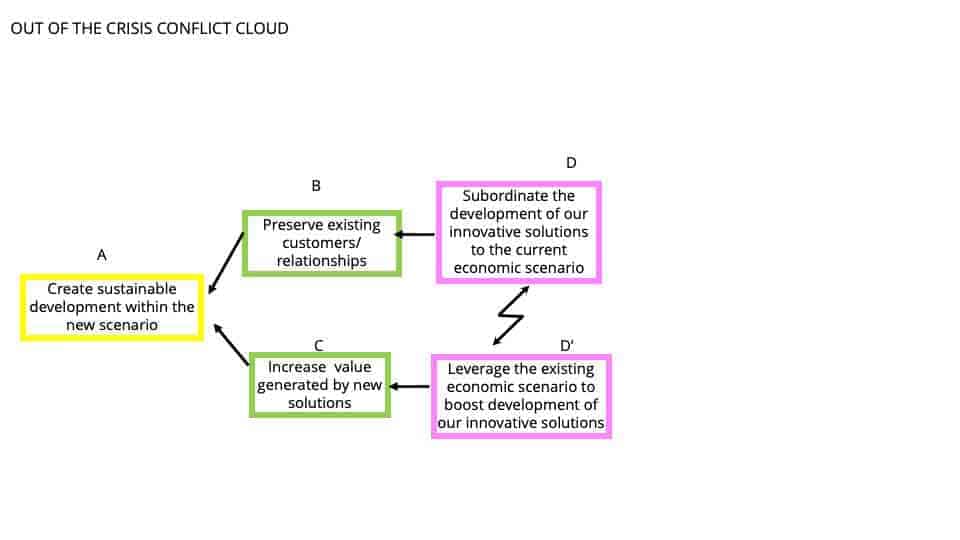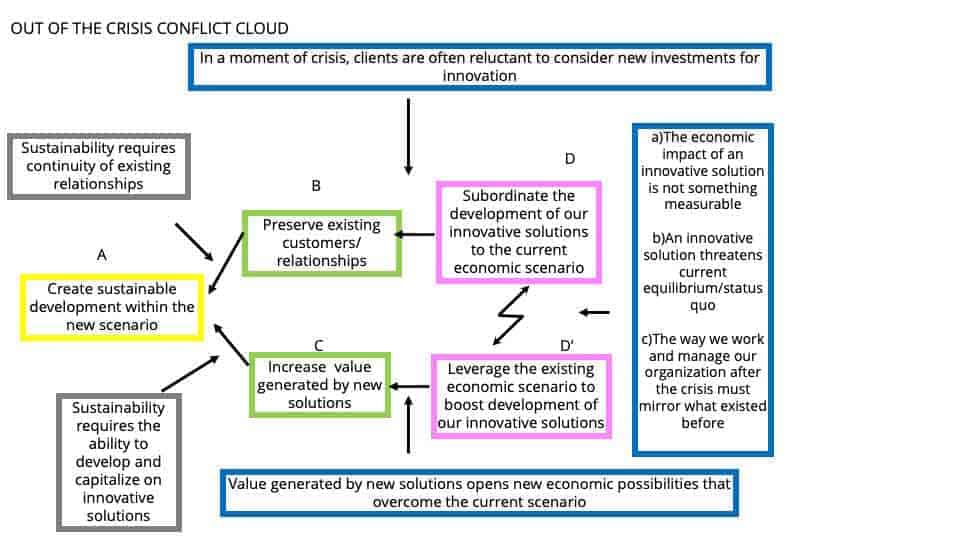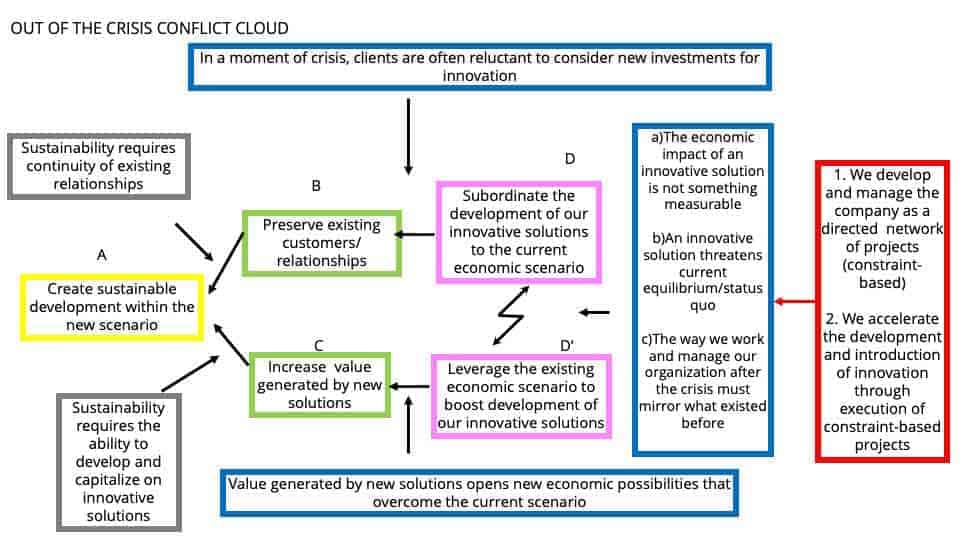In part three of this series, we introduced an approach to systems thinking from the Theory of Constraints that frames a complex problem in the form of a conflict or dilemma in order to derive a systemic, breakthrough solution. This has been a fundamental part of our work with organizations for over 20 years. Here in part four that concludes this series, we look at a specific example of what we call the ‘Out of the Crisis’ dilemma.
We worked on this dilemma with a highly successful client, based on their current reality following the crisis created by the coronavirus. This allowed the verbalization of the conflict in a more specific way but that is still relevant for the current reality of many organizations living through this crisis. We verbalized the need in B connected with control as ‘preserve existing customers/relationships’ and this leads to wanting to take the conservative action of ‘subordinate the development of our innovative solutions to the current economic scenario’. The need in C connected with vision becomes ‘increase value generated by new solutions’ and this prompts to wanting to take the expansive action of ‘leverage the existing economic scenario to boost development of our innovative solutions’. The goal common to the two needs is ‘create sustainable development within the new scenario’.

So, what are the thoughts/assumptions/mental models that create this conflict in the first place? How can we verbalize them and then find a way forward? The grey and blue boxes contain the assumptions that connect the elements of the conflict together and keep it in existence.
This is how we read the cloud once we have built it:
If our goal (A) is to create sustainable development within the new scenario and sustainability requires continuity of relations, then, (B) we must preserve existing customers/relationships, and if in a moment of crisis, our clients are often reluctant to consider new investments for innovation, then this prompts us to adopt the position (D), subordinate the development of our innovative solutions to the current economic scenario.
On the other hand:
If our goal (A) is to create sustainable development within the new scenario, and sustainability requires the ability to develop and capitalize on innovative solutions, then we must (C) increase value generated by new solutions. And if value generated by new solutions opens new economic possibilities that overcome the current scenario then this prompts us to adopt the position (D’), leverage the existing economic scenario to boost development of our innovative solutions. We find ourselves stuck in this dilemma because we make the assumptions between D and D’: the economic impact of an innovative solution is not something measurable; an innovative solution threatens current equilibrium/status quo; the way we work and manage our organization after the crisis must mirror what existed before.
The conflict, or situation of blockage, will continue to exist unless we challenge the assumptions. The assumptions between the two pink boxes D and D’ that contain the conflicting positions, are the ones we want to ‘attack’. In this way, we demonstrate to ourselves that what is keeping us stuck is neither true nor valid and we have an alternative: we can choose to change our reality. We start to do this by verbalizing statements (Injections) that invalidate the assumptions but protect the needs in B and C. This is how we create a systemic, sustainable way forward.
We have identified two injections that can help any organization step out of the blockage/paralysis that this conflict depicts. They are:
- We develop and manage the company as an oriented network of projects (constraint-based).
- We accelerate the development and introduction of innovation through execution of constraint-based projects.
The conflict cloud allows us to bring the multi-faceted network of formal and informal conversations taking place around the issues at stake into a condensed, workable and visual format. The assumptions, especially the ones between D and D’, represent the set of mental models that allow the conflict to exist. They represent the ‘cognitive constraint’ that limits our ability to overcome such a conflict. By exposing these mental models in a linguistically correct format, we can leverage them to propel the current situation of reality towards one that is more desirable.
A new covenant and a new economics
The current crisis is driving home dramatically the realization that organizations need to make more and do more with the resources they have available. We will only achieve this if we are able to undertake a shift in the way we understand how to manage all the resources available in a sustainable way. It is not just about changing our ways but about changing our understanding: it requires a new epistemological framework. The science for this shift already exists thanks to the developments in systems science, even if this area is not yet common knowledge. In order to put this science into practice, we can turn to the work of Dr. Deming and Dr. Goldratt; they have provided the foundation for it and the science of networks is the ideal companion for the work of these two management giants (as well as the scientific backdrop for understanding how viruses propagate).
We feel very fortunate and proud to have developed an operational way for their work (and the principles of Network Theory) to be integrated and made even more actionable through the Decalogue methodology. At the very heart of Deming and Goldratt’s monumental body of knowledge, there is the definition of a new covenant with the way we want to lead our lives and use our minds to ensure proper sustainability for our planet. The coronavirus has taken a tragic toll on human lives; we must transform this tragedy into a stimulus to rethink a new economics based on sustainability and on a rational use of our resources.
Every one of us, at the level of individual, family, community, nation and beyond is interconnected; indeed, we are part of a network of interdependencies. This is not simply a political and sociological stance. There is an underlying scientific basis for this shift in worldview away from a Newtonian, industrial age notion of the whole being made up of separate parts towards one of dynamic interconnection. We know from science that cells and galaxies can be viewed as systems, and as such they obey certain laws. We define an organizational system as a network of interdependent processes that work together to achieve a goal. Such systems are made up of a web of interconnections. In other words, we are understanding more and more that the reality of our work is systemic. For this reason, any attempt to manage organizations (or, for that matter, to govern countries) that is not based on this awareness is doomed to create damage.
By adopting the wisdom of what we can achieve by understanding the science of complex, oriented networks, we can also overcome the craze of unlimited growth, the lunacy of the promises that the financial world has engendered, the untenable divorce between Wall Street and main street, between what humans can achieve by designing and producing products that help other humans and the fantasies of only-mathematically-possible financial contracts that help mainly ‘the 0.1%’.
We believe that, in spite of the disasters around us, we are experiencing a unique phase in our human history: we have the knowledge, scientific and otherwise, as well as the method to foster a more systemic use of the intellect to capitalize on our intuition, to develop thorough analyses, and to design and take correct actions for the common good. What we are talking about is a transformation that comes from a more evolved form of human intelligence, one that allows intelligent, thoroughly thought-through decisions to be manifested in intelligent action.
What we propose in this series of articles is neither a fantasy nor is it particularly complicated to create. What it does require, however, is the sharing of a paradigm and a sense of urgency.
The paradigm underpinning this transformation, from the prevailing management style into one of whole system optimization, is sustainability; the urgency stems from understanding that the world is experiencing a tectonic shift and this shift calls for a completely different style of leadership. This leadership must be inspired and informed by a higher, more evolved form of intelligence. It is an intelligence that connects cause and effect and that governs decisions always in the awareness of their wider, systemic implications.
In the darkest hours of the fight against the lethal virus of Nazism the answer came, beside the heroism of so many, with the development of a new science called Systems Theory. The long road to freedom from an outdated paradigm starts from there. It is a battle we can win; we just have to decide to fight it with the right weapons.
This is the last article of a mini-series! If you would like to read the first one, click here.


















![Intelligent Management Deming Goldratt Systems [shutterstock: 384355429, tomertu]](https://e3zine.com/wp-content/uploads/2020/11/intelligent-management-deming-goldratt-systems-shutterstock_384355429.jpg)




Add Comment